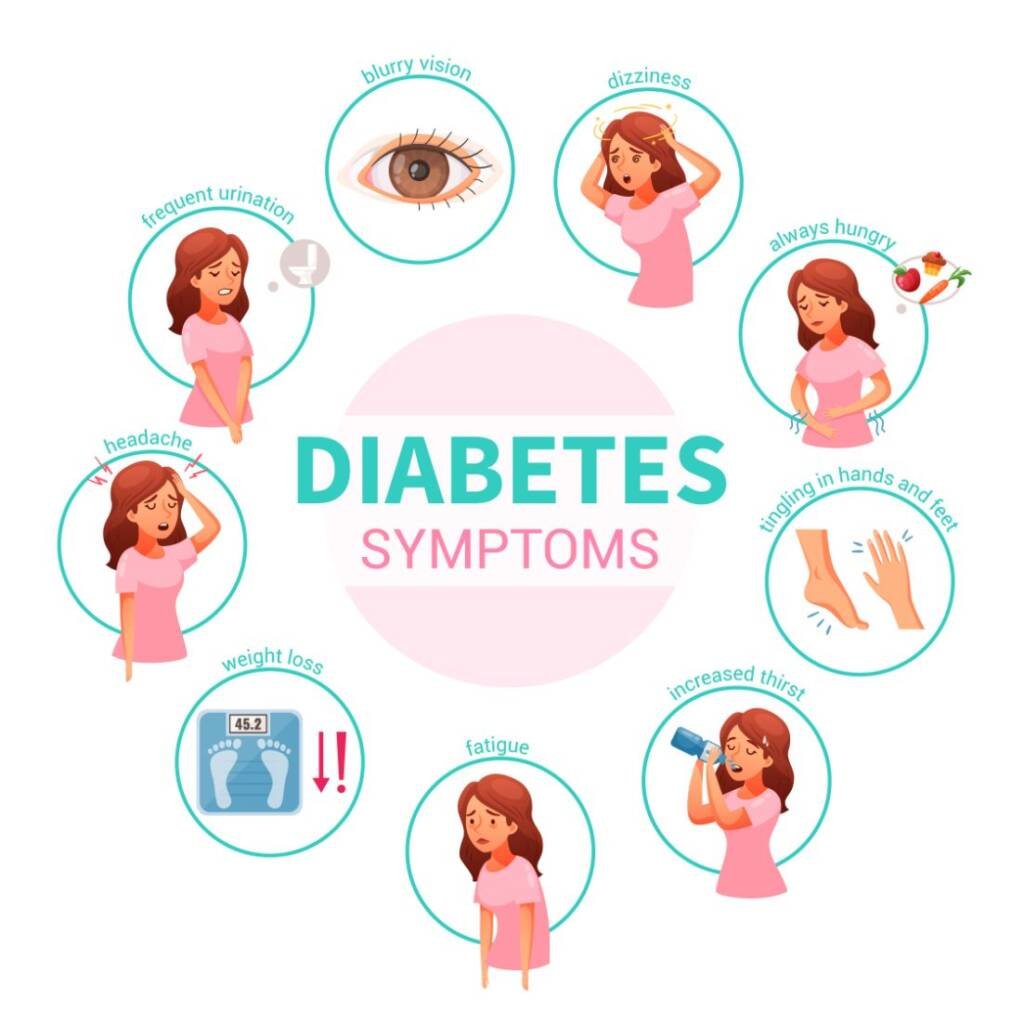Diabetes is a health condition that affects how your body processes glucose, which is the main source of energy for your cells. Glucose comes from the food you eat and is carried in your bloodstream to your cells.
Normally, the hormone insulin helps glucose enter your cells and be used for energy. However, in people with diabetes, the body either doesn’t produce enough insulin or doesn’t use it effectively. This causes glucose to build up in the bloodstream, which can lead to a variety of health problems.
What are the types of diabetes?
There are two main types of diabetes: type 1 and type 2. Type 1 diabetes is usually diagnosed in children and young adults and occurs when the body doesn’t produce enough insulin. Type 2 diabetes is more common and typically develops in adults. It occurs when the body doesn’t use insulin effectively, and can often be managed through lifestyle changes such as diet and exercise.
What symptoms does a patient with diabetes have?
Symptoms of diabetes can include increased thirst and hunger, frequent urination, blurry vision, and slow-healing sores or infections. If left untreated, diabetes can lead to serious complications such as heart disease, kidney damage, and nerve damage.
It’s important to get regular check-ups with a healthcare provider and to monitor your blood sugar levels if you have diabetes. Consult Dr. Anand, General Physician, to know more about diabetes and better diabetic control.


KNOW YOUR NUMBERS – “Measuring Success: Understanding Your Diabetes Targets”
If you have diabetes, it’s important to be aware of your blood sugar levels and the targets for managing your condition. Here are some key numbers to keep in mind:
- Diagnosis of diabetes: A diagnosis of diabetes is typically made if your fasting blood sugar level is 126 mg/dL or higher, or if your blood sugar level 2 hours after a glucose tolerance test is 200 mg/dL or higher. Your healthcare provider may also order additional tests or monitor your blood sugar levels over time to confirm a diagnosis.
- Targets for treating diabetes: The American Diabetes Association recommends the following blood sugar targets for most adults with diabetes:
- Fasting blood sugar: 80-130 mg/dL
- Blood sugar 2 hours after a meal: less than 180 mg/dL

What are complications of diabetes?
Diabetes can lead to a variety of health complications if left untreated or poorly managed. These complications can affect different parts of the body and can be both short-term and long-term.
Short-term complications of diabetes can include hypoglycemia, or low blood sugar, and hyperglycemia, or high blood sugar. Hypoglycemia can cause symptoms such as sweating, shaking, and confusion, while hyperglycemia can lead to symptoms such as increased thirst, blurred vision, and fatigue.
Long-term complications of diabetes can include damage to the nerves, blood vessels, and organs throughout the body. For example, diabetes can lead to diabetic neuropathy, which is damage to the nerves in the hands and feet that can cause pain, tingling, and loss of sensation. Diabetes can also cause damage to the blood vessels, increasing the risk of heart disease, stroke, and other cardiovascular problems.
In addition, diabetes can lead to damage to the eyes, kidneys, and other organs. Diabetes can cause diabetic retinopathy, which is damage to the blood vessels in the eyes that can lead to vision loss. It can also cause diabetic nephropathy, which is damage to the kidneys that can lead to kidney failure.
Proper management of diabetes can help reduce the risk of these complications. This can include regular monitoring of blood sugar levels, taking medications as prescribed, following a healthy diet, getting regular exercise, and getting regular check-ups with a healthcare provider. If you have diabetes, it’s important to work closely with your healthcare team at Sri Anand Child and Neuro Center to develop a management plan that works for you and to address any concerns or complications that arise. With proper management, many people with diabetes can live healthy, fulfilling lives.

However, these targets may vary depending on individual factors such as age, overall health, and other medical conditions. Your General Physician at Sri Anand Child and Neuro Center can work with you to set personalized targets for managing your diabetes.
It’s important to monitor your blood sugar levels regularly and work with your General Physician to adjust your treatment plan as needed. Proper management of diabetes can help reduce the risk of complications and improve your overall health and well-being.



